Hugo Tagholm is Chief Executive of the marine conservation organization Surfers Against Sewage. He is an environmentalist, an award-winning campaigner, and a surfer. In this interview, Hugo tells Our Shared Seas more about how Surfers Against Sewage is fighting to end sewage pollution in the UK through data collection, campaigning, and public and political engagement on an often-overlooked issue.
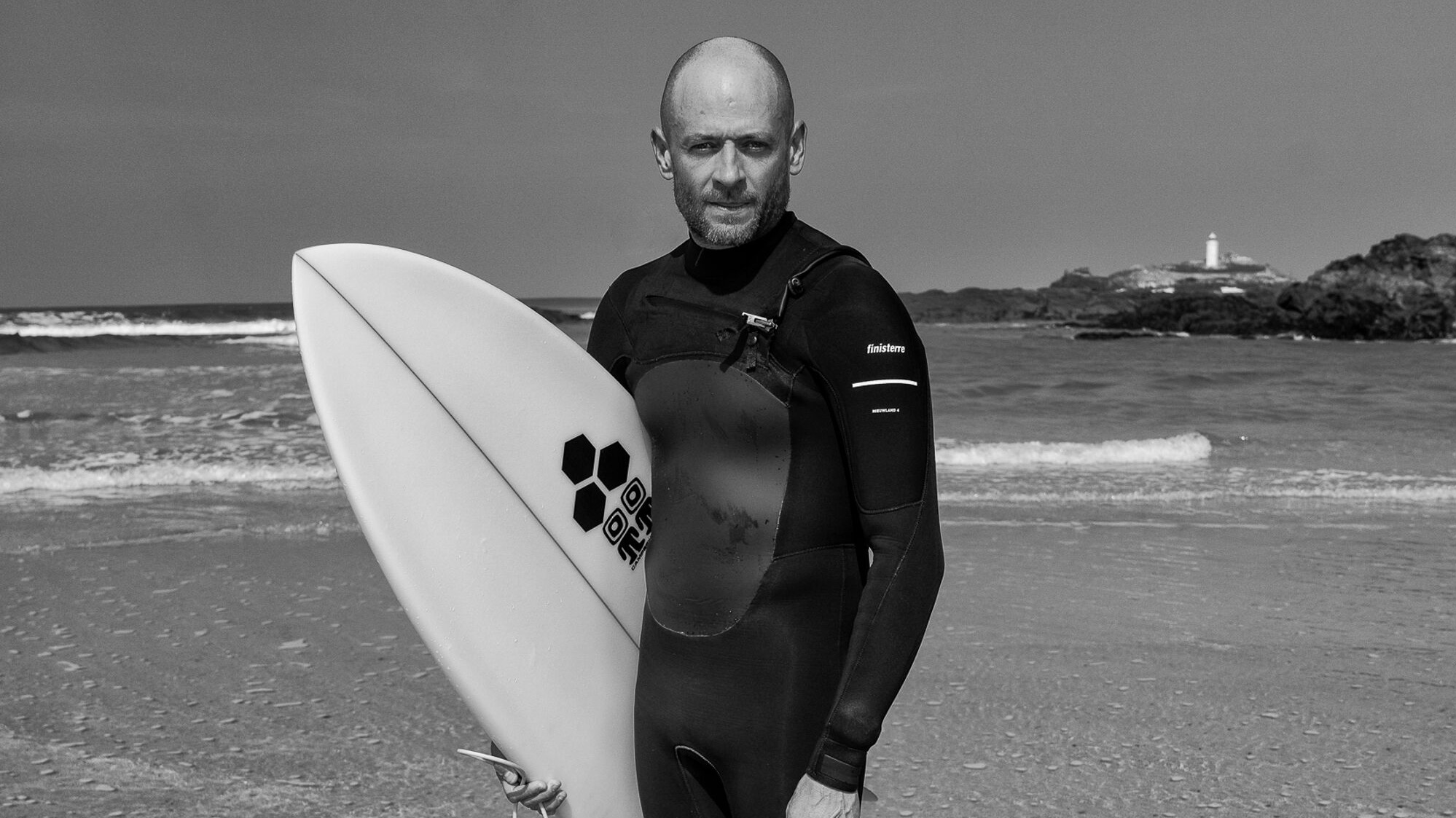
Photo: Richie Graham
Could you tell us more about the history of Surfers Against Sewage?
Surfers Against Sewage was founded over 30 years ago by a group of surfers in the southwest of England in Cornwall, who were directly affected by the chronic sewage pollution in the 1990s. Back then, a massive volume of raw sewage was routinely pumped out around the coastline, and it was polluting of most the country’s best surf spots. Surfers were at the frontline of that issue. It was just after the water industry had been privatized here in the England in 1989, which brought with it more environmental obligations. There was also key new legislation in 1991, most notably the Urban Wastewater Treatment Directive, that gave surfers an opportunity to successfully campaign, influence and drive what became an important decade of investments to tackle that first wave of sewage pollution.
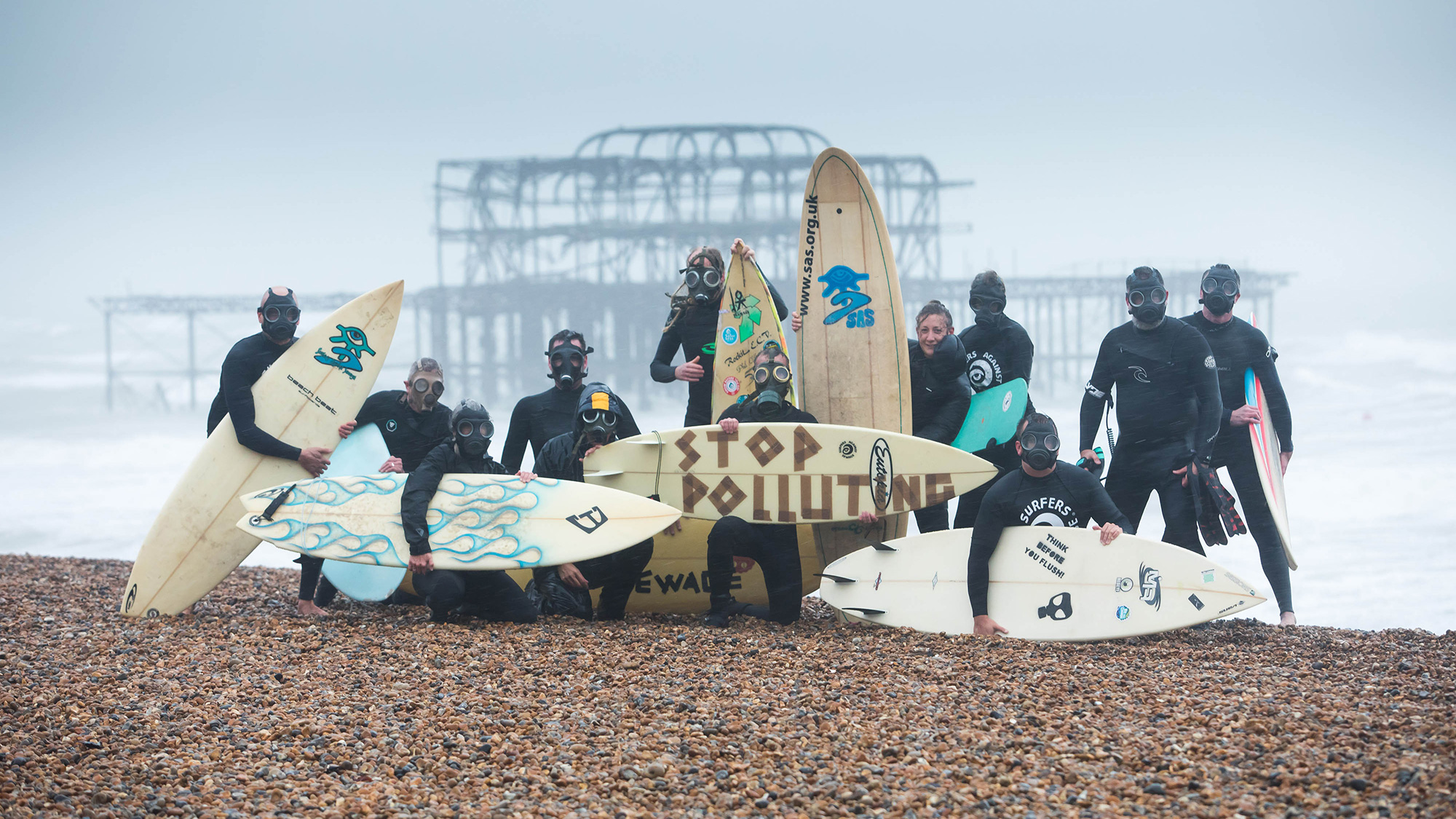
Supporters of Surfers Against Sewage on Brighton Beach in East Sussex to launch their water quality report. Photo: Ciaran McCrickard/PA Wire
Progress was good, but has been followed by less focus, investment, and regulation on the issue over time, and water companies have become complacent, often putting profits before the environment.
One of the most significant failures comes in the form of combined sewer overflows, which are the emergency sewage release valves supposedly only used when there’s heavy rain. However, these are now routinely used to release untreated effluent on an almost daily basis, bringing a new wave of sewage pollution to our rivers and ocean. So, sewage and water quality have reemerged as a priority issue for our organization, alongside our work on plastic pollution, climate change, and other interconnected issues. Sewage is a strong focal point because our sewage system is affected by climate change and carries lots of other pollutants with it, from microplastics to antibiotic-resistant bacteria. It’s a frame through which to look at everything we do.
Sewage is a strong focal point because our sewage system is affected by climate change and carries lots of other pollutants with it, from microplastics to antibiotic-resistant bacteria. It’s a frame through which to look at everything we do.
How does SAS monitor and report on coastal water quality?
Our theory of change is to connect and empower people on the frontlines and our beaches, where they’re exposed to sewage pollution and other issues that we focus on. A few years ago, we created the Safer Seas and Rivers Service—the only national real-time water-quality monitoring app and tool in the country. It monitors real-time sewage discharges in more than 375 locations that people are using for recreation, health, and well-being. We alert people’s phones when the beaches they love are unsafe for swimming, and also empower them to send direct messages to their local Member of Parliament and water company executives to call for faster action on sewage pollution. We’re not just an environmental organization—we’re about people and planet and bringing the two together to drive change, inspired by the experiences people have in the ocean.
SAS just published its 2021 Water Quality Report. What are some of the headline findings?
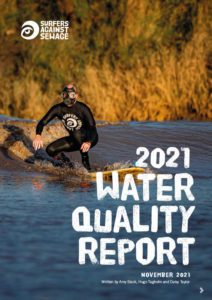
Download the report at sas.org.ul
We publish our annual Water Quality Report at the end of the Bathing Season (September) to reflect the statistics that we track in the Safer Seas and Rivers Service. We focus on those premium beaches and surf spots around the country where people use the sea the most. In 2021 we tracked over 5,500 sewage pollution events at those places, an 86 percent increase over the previous year, largely driven by one of the water companies, Southern Water. In total there were over 400,000 sewage spills last year that amounted to 3 million hours of sewage pollution going out into our rivers and ocean. We need faster action to tackle the sewage pollution crisis in our rivers and coastlines.
Last year has been a huge turning point in the fight for water quality in the UK. For those who may not be aware, what happened this year and what are the implications?
2021 was a huge, crucial year, built on a foundation of many years of campaigning. We’re very proud of what we were able to drive forward last year around the Environment Act, a huge piece of legislation covering myriad pieces of environmental legislation that we effectively lost when we came out of Europe. We managed to make water quality and sewage pollution a priority issue in the Environment Act because we inspired, engaged, and mobilized millions of people to care and act. As part of this, we built an incredible coalition with some of the leading NGOs working on water quality, which helped us secure some of strongest possible sewage pollution amendments in the Environment Act. We were very successful in calling for the legal obligations on real-time sewage pollution information from water companies, new reporting on sewage spills in our rivers, and a commitment to Parliament reporting on a new plan to tackle sewage pollution later this year.
The amendments that were passed should help drive a progressive reduction in the amount of sewage pollution, but they could have also gone further. The amendment remains somewhat ambiguous with significant wiggle room. Our job now is to hold politicians and water companies to account and realize a progressive and accelerating reduction in the frequency of sewage discharges, an improvement in water quality on our coastline and in our rivers, and the restoration of habitats for both people and wildlife on the coast.
The amount of public engagement this issue has garnered in the UK is remarkable. To what do you credit the huge amount of public interest and engagement on sewage pollution?
First, we base our campaigns in science, statistics, and facts. It’s hard for people to deny the severity of the issue if those numbers are based on data from water companies’ own systems. Second, we’ve connected people with the issue in the places they love most. It was Jacques Cousteau who said, “People protect what they love.” Our beaches are some of the most loved places in the UK. People campaigning on a national issue through a local prism has been powerful.
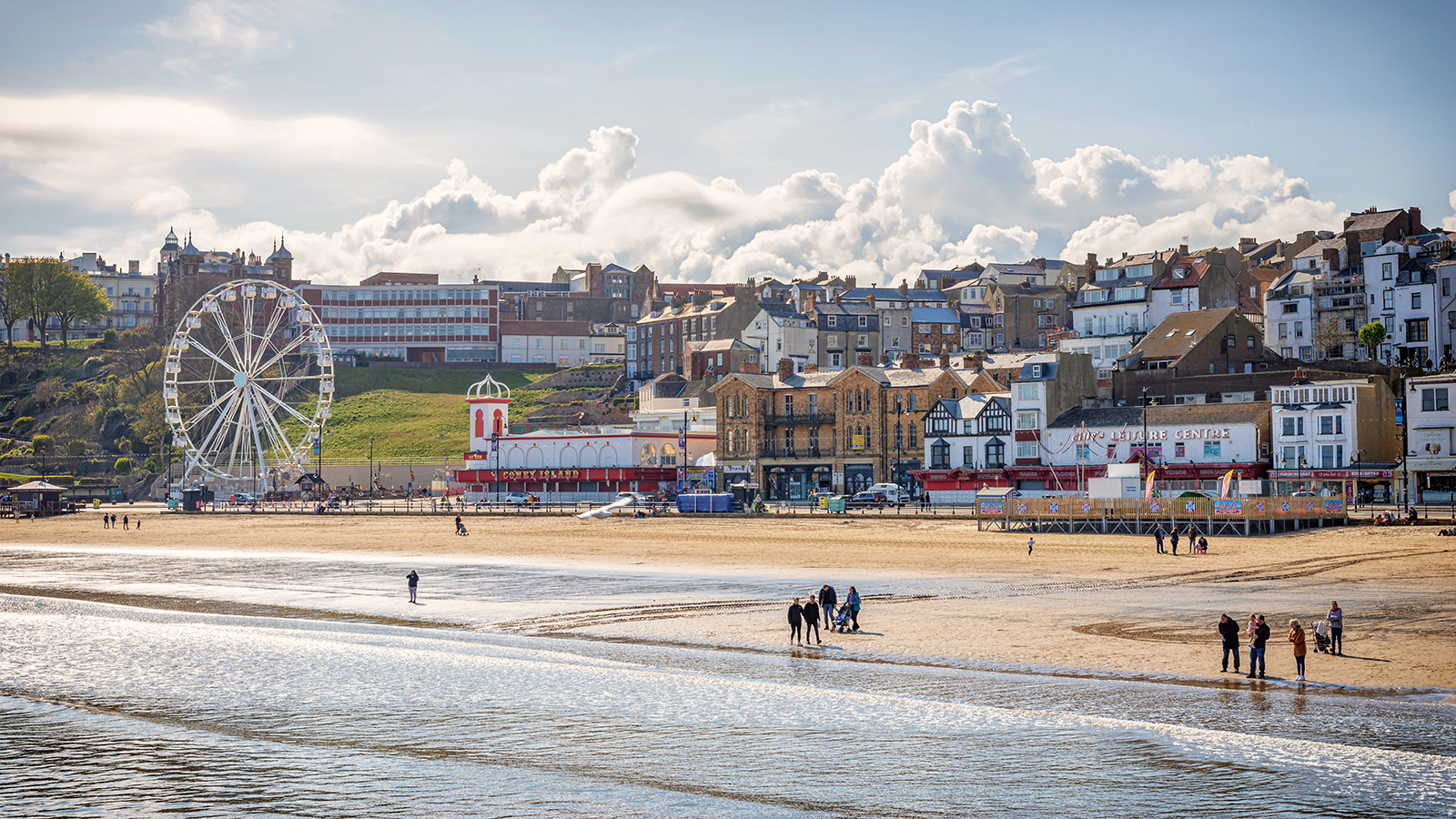
Scarborough, UK. Photo: iStock/jackcousin
We’ve also been tireless. As communicators and as campaigners, we have a real understanding of the story around this issue. We’ve taken this story, the data, and our reporting to the media and shaped it well. We’re a very trusted organization because we have a track record of impact, are transparent, and report clearly on our work. People like and respond well to that during a time where there is limited trust in the bigger institutions in the UK, as there is in the rest of the world. Also, I think authenticity is important. We’re based by the sea, we are people who use the sea, and we understand the sea. We also know how to tell our story and present the issue to the public, helping set a new expectation for action to protect our ocean.
And, of course, we’ve had this catalytic moment with the Environment Act. We’re going to have more political moments next year, and we’ll need keep the public hearts and minds focused on continuing progress in the future. I think we have a zeitgeist issue and some clear aims over the next few years and decade to tackle sewage pollution.
I think there’s also an age-old tale here. The privatized water industry has made billions of pounds of profits and dividends over the last 30 years, and paid their executives a huge amount of money, all whilst damaging the environment. That’s a story the public will never like—rightfully so. Some of these executives are making more in one year than their billpayers would make in their whole career. It’s time they put more of that back into the protection and restoration of nature. I think that’s a compelling story that drives outrage, and fundamentally, this is also getting attention because people love these spaces, and they are being polluted.
We’ve connected people with the issue in the places they love most. It was Jacques Cousteau who said, “People protect what they love.” Our beaches are some of the most loved places in the UK. People campaigning on a national issue through a local prism has been powerful.
While there have been some huge wins this year in the UK on sewage pollution, there is obviously a lot of work ahead. What do you think are the near-term policy opportunities and priorities for ending sewage pollution in the UK? What’s next for 2022?
We have a good plan set up for the next few years, but next year, we’re going to be really focused on a political opportunity in the autumn, when the government has to publish a plan to tackle sewage pollution. In March, water companies will have to release data on the number of sewage spills in 2021, and we fear the worst with yet another steep climb in pollution events, so that is another moment to focus on.
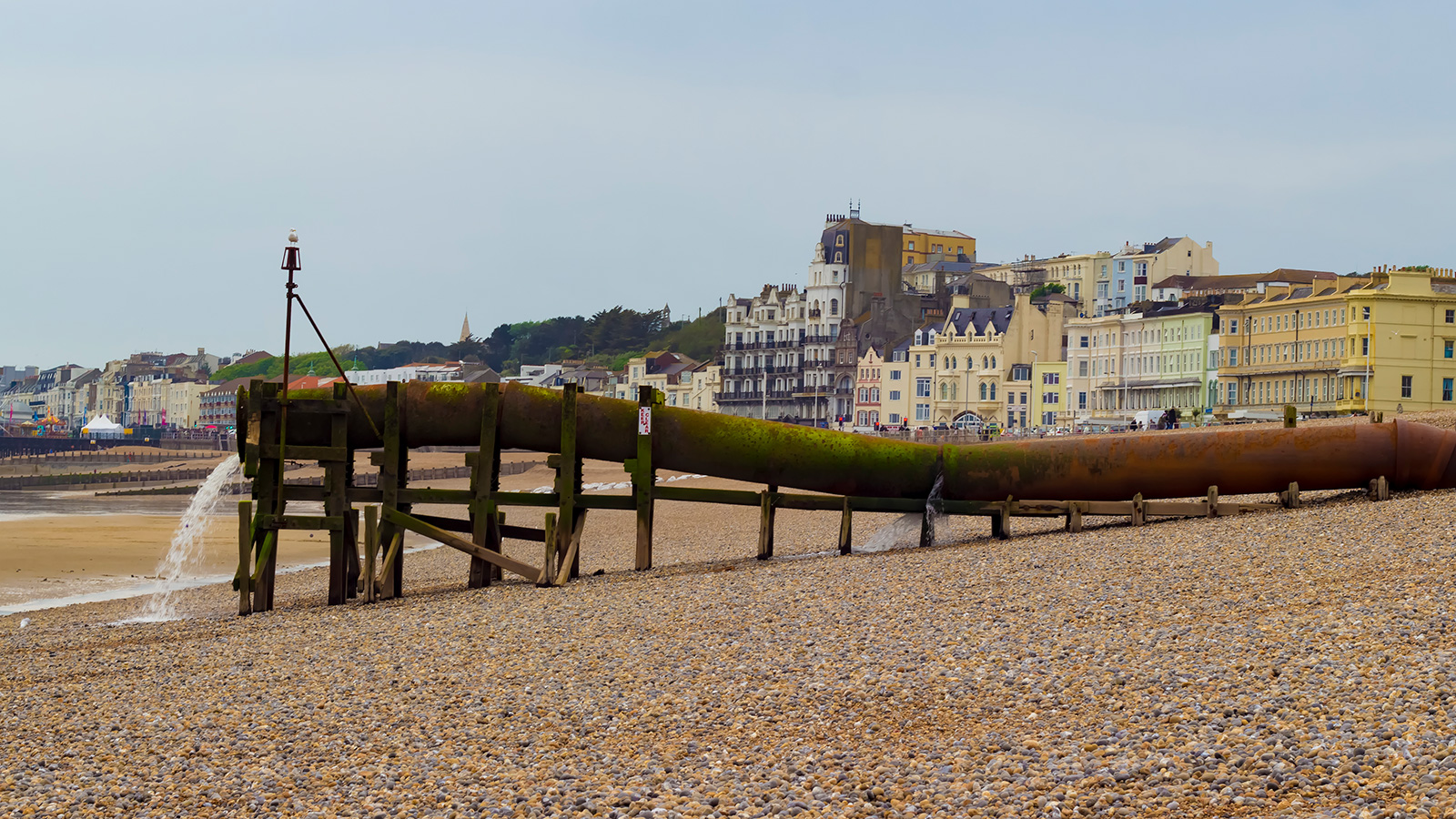
Hastings. Photo: iStock/Kurt Pacaud
It’s a big moment for us to double down on the pressure on government and on the water industry. But it’s not just about passing legislation; it’s about implementing that legislation and making sure that water companies and politicians are held to account. The government said that the amendments they passed in the Environment Act will do the job over the coming years, but we’ll be chasing down what those amendments truly mean in practice. Change needs to be borne out in the data. If we had 3 million sewage pollution hours last year, what does that become in 2022? What does it become in 2023? If we saw an 86 percent rise in the number of sewage pollution events in our bathing waters around the coastline over the past 12 months, what will that look like over the next 12 months? What will the plan they put together and publish in Parliament look like? How will it force companies to invest more of their profits back into protecting the environment?
The Safer Seas and Rivers Service will also be redeveloped, and we’ll be adding dozens of locations, reporting on the data in a bigger, better way, and connecting more people to their water company CEOs and politicians. We’re going to keep mobilizing more citizen scientists to collect data with us. People love being involved and active, particularly now, as the climate crisis can be quite daunting. People want practical local actions.
How can marine conservation funders engage on this issue of coastal water quality and sewage pollution?
I was at COP26 up in Glasgow in November, and it was great to see coastal restoration, blue carbon, and some of the habitats like kelp forests, seagrass meadows, and salt marshes discussed at a higher level. But the restoration goals the world is fixated on will not be successful unless we deal with water quality. We are pumping huge volumes of sewage pollution into our ocean, creating dead zones and damaging vital and fragile ecosystems, which impacts blue carbon and biodiversity, because we’re smothering reefs and fish nurseries.
The restoration goals the world is fixated on will not be successful unless we deal with water quality. We are pumping huge volumes of sewage pollution into our ocean, creating dead zones and damaging vital and fragile ecosystems, which impacts blue carbon and biodiversity, because we’re smothering reefs and fish nurseries.
Sewage pollution connects with many larger issues surrounding the environment and human health. With climate change, there has been more rainfall, now predicted to get worse and put more pressure on the sewage system. Studies have shown that surfers and swimmers are three times more likely to have antibiotic-resistant bacteria in their gut than the background population, just from swimming in the sea. The sewage system is a network of horizontal smokestacks pumping out emerging threats to human health. Antibiotic-resistant bacteria seem to be one of the major threats to human society. Plastic pollution, chemicals, and hydrocarbons—all these things are coming from sewage pollution, not just here in the UK, but around the world. This is getting worse with climate change and exacerbated by population increases. We need to get a handle on treating our wastewater, particularly where people are encountering it on beaches.
Our water treatment systems aren’t removing everything that is a threat to human health and dealing with waste the way they should. We need wholesale engagement on this issue. Water is one of the two essential fluids to all life, and we’re treating it like a global garbage can.
We need wholesale engagement on this issue. Water is one of the two essential fluids to all life, and we’re treating it like a global garbage can.
The success your organization and its partners have had with this issue seems to show there is hope for these issues and raising awareness of them.
Hope is a good note to end on, and important. We have the ingenuity and resources to solve this issue, and we have a lot of beauty and natural wonder to protect. We’re very lucky.
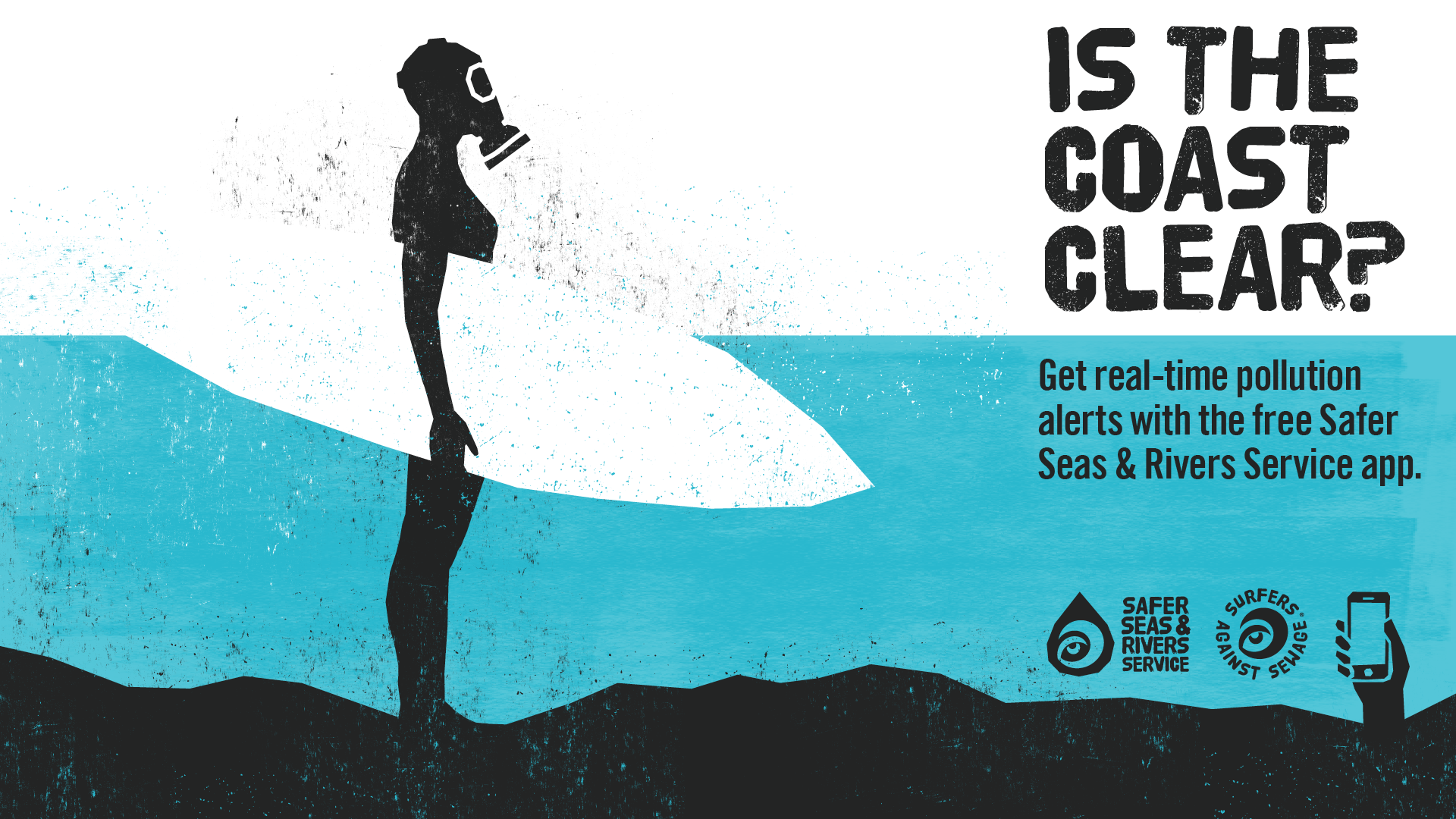
Download the app at sas.org.uk
